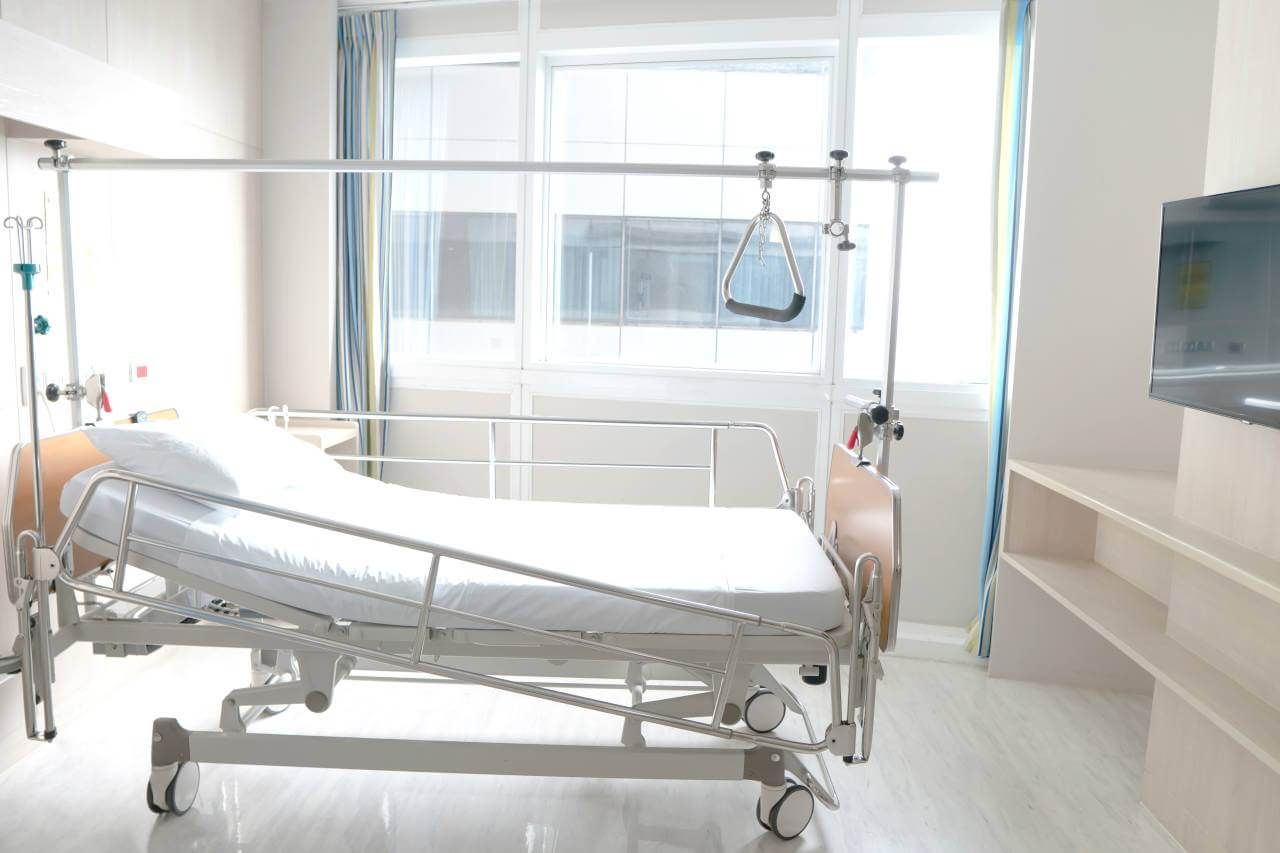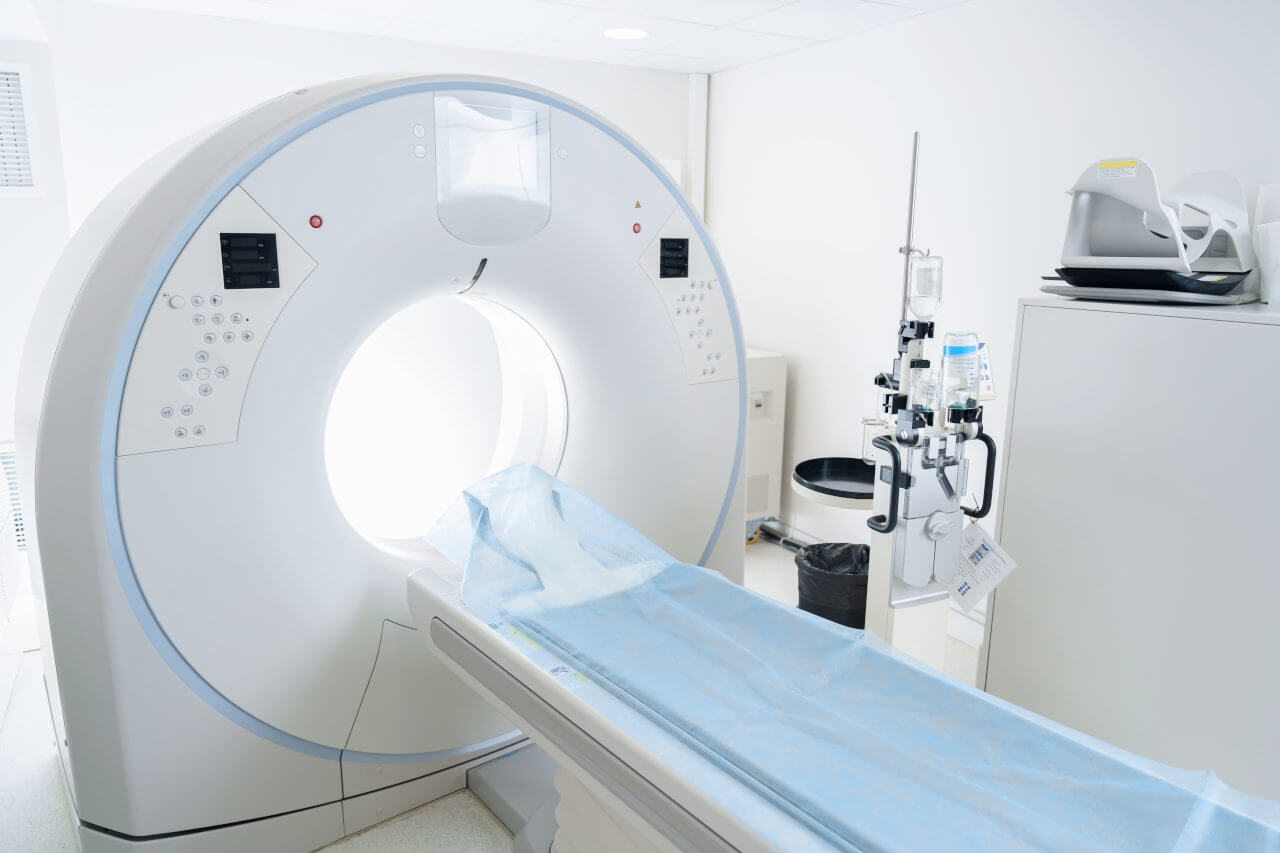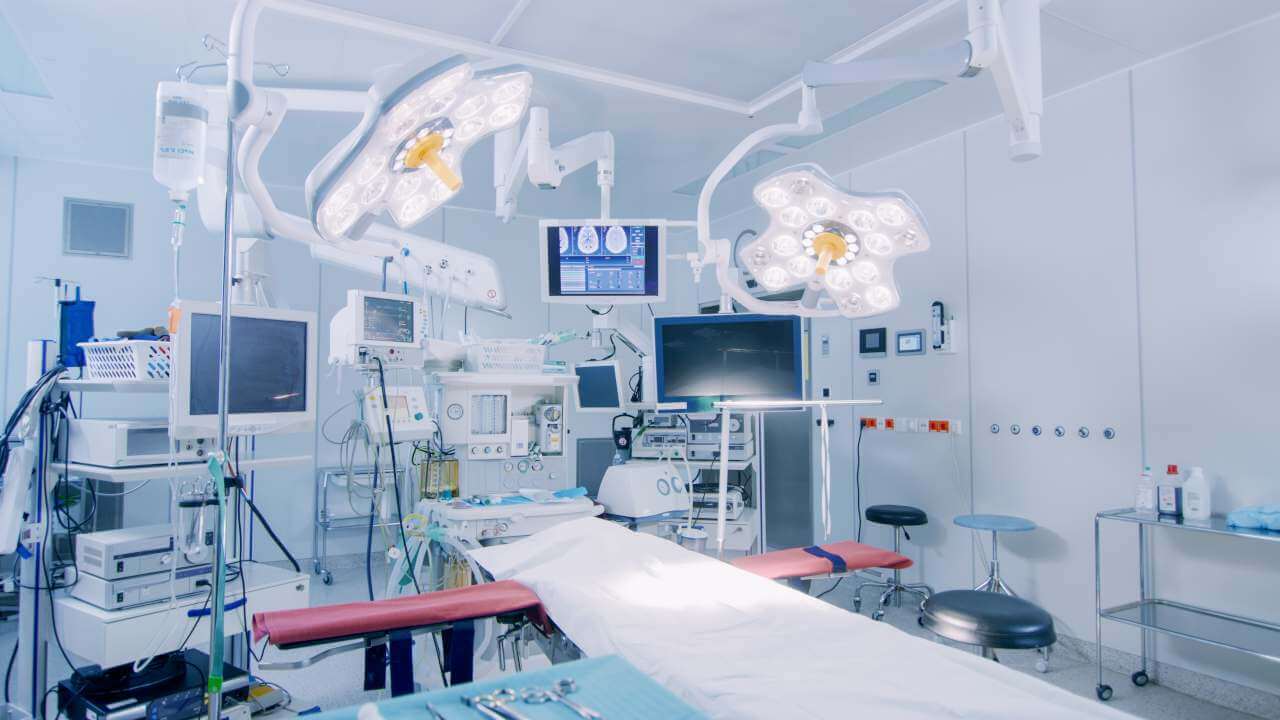
The program includes:
- Initial presentation in the clinic
- clinical history taking
- review of medical records
- physical examination
- laboratory tests:
- complete blood count
- general urine analysis
- biochemical blood test
- inflammation markers (CRP, ESR)
- blood coagulation analysis (aPTT, PT, INR)
- tumor markers
- neurological examination
- electrophysiological studies (on indications):
- ENMG (electroneuromyography)
- EEG (electroencephalography)
- SEPs (somatosensory evoked potentials)
- VEPs (visually evoked potentials)
- BAEP tests (brainstem auditory evoked potential)
- CT/MRI scan
- preoperative care
- tumor biopsy under neuronavigation
- histological and immunohistochemical study of tissues
- symptomatic treatment
- the cost of essential medicines and materials
- nursing services
- control examinations
- full hospital accommodation
- developing of further guidance by specialists
in oncology and radiotherapy
Required documents
- Medical records
- MRI/CT scan (not older than 3 months)
- Biopsy results (if available)
Service
You may also book:
 BookingHealth Price from:
BookingHealth Price from:
About the department
The Department of Adult and Pediatric Neurosurgery, Spinal Surgery at the Hegau Bodensee Hospital Singen provides the full range of medical services in its fields of competence. The department is a specialized medical facility for the conservative and surgical treatment of spinal diseases. Patients with spinal pathologies receive comprehensive medical care here, so each clinical case is studied at an interdisciplinary board with the participation of neurosurgeons, neurologists, orthopedists, psychologists, and physiotherapists. Conservative therapy options are considered first-line treatments. If the patient has indications for spinal surgery, minimally traumatic surgical procedures are performed using minimally invasive, microsurgical, and endoscopic techniques. The department has accumulated impressive experience in the treatment of chronic back pain using neuromodulation. The clinical priorities of the healthcare facility also include the treatment of tumors of the nervous system, spinal injuries, traumatic brain injuries, and hydrocephalus in adults and children. It should be noted that the department underwent extensive renovations in 2023. The operating rooms were fitted out with state-of-the-art equipment to allow surgeons to perform the most sparing and safe surgical procedures on the brain and spinal cord. The department's team of neurosurgeons works in strict accordance with current clinical protocols and the recommendations of the German Society of Neurosurgery (DGNC).
The department is headed by Prof. Dr. med. Sven Gläsker, a highly qualified neurosurgeon with extensive experience in the surgical treatment of spinal diseases and injuries, oncological diseases of the nervous system, and hydrocephalus. Prof. Gläsker is one of the few experts in Europe with in-depth knowledge of the treatment of Von Hippel-Lindau disease, a rare genetic syndrome characterized by the simultaneous formation of benign and malignant tumors in several organs. Dr. Gläsker has completed several fellowships in the USA (Stanford University in California, Mayo Clinic in Rochester, and the National Institutes of Health) and worked for many years in the Departments of Neurosurgery at the University Hospital of the Free University of Brussels and the University Hospital Freiburg.
The key to successful surgical treatment of diseases of the spine, brain, and spinal cord is high-tech equipment, in addition to the high skills of neurosurgeons. The department strives to provide treatment that is not only effective but also as sparing as possible. This approach eliminates the risk of neurological deficits after the surgical procedure. The department's operating rooms have the latest generation equipment such as the advanced surgical microscopes for fluorescence-guided surgery using 5-aminolevulinic acid (5-ALA), innovative neuronavigation systems for stereotactic biopsy for suspected brain tumors and minimally invasive surgical removal of brain tumors, cavitron ultrasonic surgical aspirator (CUSA) and a high-resolution intraoperative ultrasound device for the safe surgical removal of brain tumors, specialized equipment for performing minimally traumatic operations on the spine while preserving the integrity of the back muscles, which contributes to the rapid restoration of mobility in the postoperative period, and other innovations. The optimal type of surgery for each patient is selected individually, and every neurosurgical procedure is carefully planned by the department's specialists.
The main specialty in the department is spinal surgery. A team of neurosurgeons regularly treats patients of various age groups with herniated discs, spinal stenosis, spinal deformities, spinal injuries, spondylosis, spondylodiscitis, radiculopathies, and benign and malignant tumors of the spine. If clinically indicated, the department's doctors use only conservative treatment, which is based on drug therapy and physiotherapy. However, in some cases, the only effective treatment for spinal pathology is surgery. The neurosurgeons in the department prefer minimally traumatic surgery using minimally invasive, endoscopic, and microsurgical techniques. Patients are able to get back on their feet quickly and experience significant improvement within the first few days after surgery. The department's surgeons are also skilled in open spinal surgery, which is a last-line treatment option in complex clinical situations.
The department is deservedly proud of its successful results in the treatment of chronic back pain using neuromodulation. This innovative therapeutic procedure is used in cases where chronic back pain cannot be relieved by classical conservative therapy methods or as an alternative treatment option for patients at high surgical risk with serious comorbidities. The essence of neuromodulation is as follows: neurosurgeons implant a small stimulator under the skin under local anesthesia; it generates a low-voltage current that stops or alters the transmission of pain signals to the brain, causing the patient to experience a mild tingling sensation instead of pain. This treatment method not only allows patients to get rid of chronic back pain but also eliminates the need to take strong painkillers that cause severe side effects.
An important part of the work of the neurosurgeons in the department is the treatment of benign and malignant brain and spinal cord tumors. Patients diagnosed with an oncological disease of the nervous system require comprehensive treatment that includes surgical resection of the tumor, irradiation, and chemotherapy. That is why neurosurgeons, oncologists, and radiation oncologists work together with the patient during the treatment planning phase and throughout the treatment process. These specialists develop the most effective treatment plan together, taking into account the specific type of tumor, the stage of the cancer, and other clinical data. The first-line treatment is most often surgical resection of the brain or spinal cord tumor, which is performed by neurosurgeons. The specialists perform these operations using state-of-the-art neuronavigation systems, a cavitron ultrasonic surgical aspirator (CUSA), and an intraoperative ultrasound device, which contributes to high safety and eliminates the risk of neurological deficits.
The department is one of the few medical facilities in Europe and throughout the world that treats patients with Von Hippel-Lindau disease. This rare hereditary syndrome causes the formation of benign and malignant tumors in several organs, such as retinal angiomas, cerebellar hemangioblastomas, brainstem hemangioblastomas, spinal cord hemangioblastomas, kidney cancer, pheochromocytomas, pancreatic cysts, and other neoplasms. If detected early, tumors respond well to treatment, so the department offers a special screening program for such patients. Prof. Sven Gläsker, the Head Physician of the department, has exceptional expertise in the medical care of patients with Von Hippel-Lindau disease. He has treated this hereditary syndrome throughout his clinical practice, has overseen many research projects, and is a member of the Clinical Advisory Board of the VHL Family Alliance in the USA and the VHL Europa.
The department's range of medical services includes the following:
- Surgery for spinal diseases in adults and children
- Surgery for herniated discs
- Surgery for spinal stenosis
- Surgery for spinal deformities
- Surgery for spinal injuries
- Surgery for spondylosis
- Surgery for spondylodiscitis
- Surgery for radiculopathy
- Surgery for benign and malignant spinal tumors
- Surgery for chronic back pain (neuromodulation)
- Surgery for benign and malignant brain tumors in adults and children
- Surgery for traumatic brain injuries in adults and children
- Surgery for hydrocephalus in adults and children
- Special screening program for patients with Von Hippel-Lindau disease and surgery for benign and malignant tumors caused by this genetic syndrome
- Other medical services
Curriculum vitae
Higher Education and Professional Career
- Since 05.2023 Head Physician, Department of Adult and Pediatric Neurosurgery, Spinal Surgery at the Hegau Bodensee Hospital Singen; Visiting Professor, Faculty of Medicine, Free University of Brussels.
- 2022 - 2023 Neurosurgeon (specialization: spinal surgery, pain management, and neuromodulation), Orthopedic Clinic Gundelfingen.
- 2019 - 2022 Neurosurgeon (specialization: spinal surgery, pain management, neuromodulation, and the treatment of Von Hippel-Lindau disease), Dr. Bani Neurosurgery Clinic Singen.
- 2015 - 2019 Managing Senior Physician and Deputy Head Physician (specialization: spinal surgery, neuro-oncology, and pituitary surgery), Department of Neurosurgery, University Hospital of the Free University of Brussels.
- 2015 Professorship.
- 2006 - 2015 Neurosurgeon (specialization: neuro-oncology, vascular neurosurgery, the treatment of hemangioblastoma, and the treatment of Von Hippel-Lindau disease), Department of Neurosurgery, University Hospital Freiburg.
- 2012 Extraordinary Professorship, Albert Ludwig University of Freiburg.
- 2012 Senior Physician, Department of Neurosurgery, University Hospital Freiburg.
- 2010 Board certification in Neurosurgery.
- 2009 Habilitation. Subject: "Causes of the development of hemangioblastoma and Von Hippel-Lindau disease."
- 2004 - 2006 Postdoctoral Fellowship, German Research Foundation (DFG), National Institutes of Health, Bethesda, Maryland, USA.
- 2005 Admission to medical practice in the USA, ECFMG certificate.
- 2002 - 2004 Intern and Assistant Physician, Department of Neurosurgery, University Hospital Freiburg.
- 2003 Admission to medical practice in Germany.
- 2002 Thesis defense. Subject: "Hemangioblastomas of the central nervous system and Von Hippel-Lindau disease."
- 1994 - 2001 Medical studies, Albert Ludwig University of Freiburg.
Memberships in Professional Societies and Organizations
- German Society of Neurosurgery (DGNC).
- Professional Association of German Neurosurgeons (BDNC).
- German Cancer Society (DKG).
- Scientific Advisory Board of the Association for VHL Patients and Their Families.
- Clinical Advisory Board, VHL Family Alliance, USA.
- Neuro-Oncology Working Group (NOA).
- VHL Europa.
Photo of the doctor: (c) Hegau-Bodensee-Klinikum Singen
About hospital
The Hegau Bodensee Hospital Singen enjoys a reputation as the largest medical complex in the Konstanz district of Baden-Wuerttemberg. The hospital is located in a picturesque region near the magnificent Lake Constance and is surrounded by well-maintained parkland. The healthcare facility is an academic hospital of the Albert and Ludwig University of Freiburg, one of the oldest and most prestigious educational institutions in Germany. The hospital is equipped with the latest technology and has a comfortable infrastructure. The health of the patients is in the safe hands of highly qualified specialists with many years of experience. The top priority at the hospital is a personalized approach to each clinical case with due consideration of the patient's needs and wishes.
The Hegau Bodensee Hospital Singen presents many specialties of modern medicine, including neurosurgery, spinal surgery, general and abdominal surgery, vascular surgery, cardiology, gastroenterology, nephrology, oncology, hematology, gynecology, urology, orthopedics, trauma surgery, and others. The hospital has unique expertise in neurosurgery and spinal surgery, and these medical fields are a key area of its specialization. The medical complex is home to the advanced Cancer Center Hegau Bodensee, which has been awarded quality certificates by the German Cancer Society (DKG) for the treatment of colon cancer, breast cancer, prostate cancer, kidney cancer, bladder cancer, and other oncological diseases. The hospital also has a Stroke Unit (certified by the German Stroke Society, DSG) and a Chest Pain Unit (certified by the German Society for Cardiology, DGK).
The hospital has 640 inpatient beds available, and many medical services are provided on an outpatient basis. The Hegau Bodensee Hospital Singen has a strict quality management system to ensure that each patient receives top-notch medical services. Patient care is of great importance: the doctors and nursing staff are always attentive, open to dialog, and ready to support the patient in every possible way on their way to recovery.
Photo: (с) depositphotos
Accommodation in hospital
Patients rooms
The patients of the Hegau Bodensee Hospital Singen stay in cozy single and double rooms with all the necessary amenities. The patient room is furnished with an automatically adjustable bed, a bedside table, a wardrobe, a table and chairs, and a TV. Each patient room has an ensuite bathroom with a shower and a toilet.
Meals and Menus
The hospital offers delicious and varied meals three times a day: breakfast, lunch, and dinner. For lunch, there are three set menus to choose from.
If, for some reason, you do not eat all the foods, you will be offered an individual menu. Please inform the medical staff about your dietary preferences prior to treatment.
Further details
Standard rooms include:
![]() Toilet
Toilet
![]() Shower
Shower
![]() Wi-Fi
Wi-Fi
![]() TV
TV
Religion
There is a chapel on the premises of the hospital where you can have privacy for prayer at any time of the day. Divine services are held in the chapel on Saturdays.
Accompanying person
Your accompanying person may stay with you in your patient room or at the hotel of your choice during the inpatient program.
Hotel
You may stay at the hotel of your choice during the outpatient program. Our managers will support you for selecting the best option.




